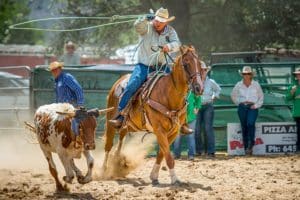Myths About Equine Colic Surgery

Your horse needs colic surgery.” This is the statement horse owners hope they never hear from their veterinarians. Unfortunately, colic, or abdominal pain, is common in horses, and approximately 10% of cases require surgical intervention. Improvements in recognizing when horses need referral to a surgical facility, more advanced diagnostic capabilities, and safer anesthetic protocols developed over the past few decades have improved prognoses for horses undergoing colic surgery. Yet, many owners still perceive colic surgery in a negative light. They might know someone whose horse had colic surgery, or people have told them how horses do after it. The outcome in those cases, instead of the facts, can heavily sway decisions to pursue surgery. Let’s look at which common rumors are just myths.
Myth: My horse is too old for surgery
Age is not a disease. As veterinary care and horse husbandry have improved, horses’ athletic careers and life expectancies have been extended. Many horses are being ridden well into their 20s, and surgical centers have seen an increase in colic surgeries performed on older patients in recent years. Researchers have even investigated whether age is a significant factor in predicting outcome in adult horses undergoing colic surgery. A University of Pennsylvania team compared outcomes in mature (4-15 years old) horses to those in geriatric (>20 years) horses and found similar postoperative complication incidence and survival. These and other researchers have concluded that age alone is not associated with outcome and not a reason to decline colic surgery.
Myth: My horse will never go back to the same level of performance after colic surgery
While colic surgery is a major procedure with a relatively long recovery, horses can and do commonly go back to their previous performance levels. Typically, recovery consists of around three months of restricted exercise, with most horses back to full exercise in four to five months. Most tendon or ligament injuries recover much more slowly. Immonen et al. recently reviewed records of 200-plus horses of varying breeds and disciplines that had undergone colic surgery to determine how many went back to work. They found that 84% could perform at their previous or intended disciplines after surgery and 79% were performing at the same level or higher. If horses are discharged from the hospital, there’s a good chance they can go back to their prior jobs
Create a free account with TheHorse.com to view this content.
TheHorse.com is home to thousands of free articles about horse health care. In order to access some of our exclusive free content, you must be signed into TheHorse.com.
Start your free account today!
Already have an account?
and continue reading.
Related Articles
Stay on top of the most recent Horse Health news with

















